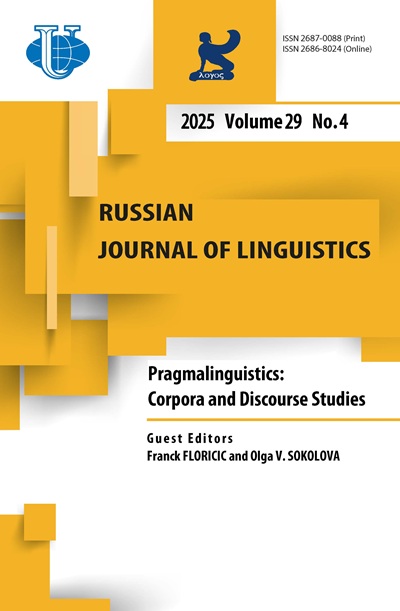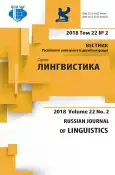CLASSICAL ELEMENTS AND WORD-FORMATION IN ACADEMIC DISCOURSE
- Authors: KOROTKINA I.B.1
-
Affiliations:
- Moscow School of Social and Economic Sciences
- Issue: Vol 22, No 2 (2018)
- Pages: 389-403
- Section: RHETORIC, GRAMMAR AND WORD-FORMATION
- URL: https://journal-vniispk.ru/2687-0088/article/view/345031
- DOI: https://doi.org/10.22363/2312-9182-2018-22-2-389-403
- ID: 345031
Cite item
Full Text
Abstract
About the authors
IRINA BORISOVNA KOROTKINA
Moscow School of Social and Economic Sciences
Email: irina.korotkina@gmail.com
PhD, Head of the Interdisciplinary Department of English Moscow School of Social and Economic Sciences, Associate professor at the School of Public Policy, Russian Presidential Academy of National Economy and Public Administration. She is a Member of the National Society of English Teachers (NATE) and author of a number of teaching manuals, educational programs and more than 70 scientific publications in the field of English language teaching methodology, academic literacy, distance learning and the use of Information and communication technologies in the educational process 82/2 Vernadsky prospect, Moscow, 119571, Russian Federation
References
- Adams, Valerie (2013). An Introduction to Modern English Word-formation. London: Routledge: Taylor and Francis Group.
- Ayers, Donald M. (1986). English Words from Latin and Greek elements. University of Arizona Press.
- Bauer, Laurie (2002). English Word-formation. Cambridge Textbooks in Linguistics. Cambridge University Press.
- Bhatia Vijay K. (2002). A Generic View of Academic Discourse. Academic Discourse. John Flowerdew (ed.) 2002. 21-39.
- Bizzel, Patricia (1999). Hybrid academic discourses: what, why, how. Composition Studies, 27 (2). 7-21.
- Bloomfield, Leonard (1935). Language. London: George Allen & Unwin.
- Campbell, Colin (2007). English for Academic Study: Vocabulary. Reading: Garnet.
- Callella, Trisha (2004). The Learning Works: Prefixes and Suffixes, Grades 4-8: Teaching Vocabulary to Improve Reading Comprehension. Creative Teaching Press.
- Chomsky, Naom (1957). Syntactic Structures. The Hague: Mouton.
- Connor, Ulla (2008). Mapping multidimensional aspects of research. Contrastive rhetoric: reaching to intercultural rhetoric. Ulla Connor, Ed Nagelhout & William V. Rozycky (eds.). John Benjamins Publishing Company, pp. 299-316.
- Cotter, Colleen (2001). Discourse and Media. The Handbook of Discourse Analysis. Deborah Schiffrin, Deborah Tannen & Heidi E. Hamilton (eds.), pp. 416-436.
- Cummins, James (1996). Negotiating identities: Education for empowerment in a diverse society. Los Angeles, CA: California Association for Bilingual Education.
- Cummins, James (2000). Language, Power and Pedagogy: Bilingual Children in the Crossfire. Clevedon, England: Multilingual Matters.
- Draze, Dianne (2005). Red Hot Root Words: Mastering Vocabulary With Prefixes, Suffixes And Root Words (Book 2). Prufrock Press.
- Flowerdew John (ed.) (2002). Academic Discourse. Routledge: Taylor & Francis Group.
- Flowerdew, John (2008). Scholarly writers who use English as an additional language: What can Goffman’s “Stigma” tell us? Journal of English for Academic Purposes, 7, 77-86.
- Grabe, William and Kaplan, Robert B. (1996). Theory and Practice of Writing: An applied linguistic perspective. Harlow: Pearson Education.
- Green, Tamara M. (2015). The Greek and Latin Roots of English. 5th ed. Lanham: Rowman & Littlefield.
- Harris, Zellig S. (1951) Methods in Structural Linguistics. Chicago: University of Chicago Press.
- Hatch, Evelyn (1992). Discourse and Language Education. Cambridge: Cambridge University Press.
- Hyland, Ken (2000). Disciplinary Discourses: Social Interactions in Academic Writing. London, Longman.
- Hyland, Ken (2006). Disciplinary differences: Language variation in academic discourses. Hyland, Ken & Bondi, Marina (Eds.) Academic Discourse Across Disciplines. Frankfort: Peter Lang. pp. 17-45.
- Hyland, Ken (2011) Academic Discourse. Hyland, Ken & Paltridge Brian (eds.) The Bloomsbury Companion to Discourse Analysis. Bloomsbury.
- Jordan, Robert R. (1997). English for Academic Purposes: A guide and resource book for teachers. Cambridge: Cambridge University Press.
- Kastovsky, Dieter (1977). Word-formation, or: at the crossroads of morphology, syntax, semantics and the lexicon. Folia Linguistica, 10. 1-33.
- Kastovsky, Dieter (2009). Astronaut, astrology, astrophysics: About combining forms, classical compounds and affixoids. Selected Proceedings of the 2008 Symposium on New Approaches in English Historical Lexis (HEL-LEX), Lammi, Finland, 25-28 April 2008, 1-13.
- Korotkina, Irina B. (2016). Academic Vocabulary for Social Sciences. Moscow: HSE Publishing House.
- Korotkina, Irina B. (2017). Expanding academic vocabulary through logical games. Problems of Contemporary Science and Practice. Tambov State Technical University. 66 (4), 173-180.
- Levine, Harold (1965) Vocabulary for the College Bound Student. Amsco School Publications.
- McCarthy, M. and Carter, R. (1994). Language as Discourse: Perspectives for Language Teaching. London: Longman.
- McCarthy & O’Dell (2008). Academic Vocabulary in Use. Cambridge, England: Cambridge University Press.
- Menzel, K. & Degaetano-Ortlieb, S. (2017). The diachronic development of combining forms in scientific writing. Lege Artis: Language yesterday, today, tomorrow. II (2). 185-234.
- Olshtain, E. & Celce-Murcia M. (2001). Discourse analysis and language teaching. The Handbook of Discourse Analysis. D.Schiffrin, D.Tannen & H.Hamilton (eds.). Blackwell Publishers, 2001, pp. 707-724.
- Pennanen, E.V. (1972). Current views of word-formation. Neuphilologische Mitteilungen. 73, 292-308.
- Plag, I. (2003). Word-formation in English. Cambridge: Cambridge University Press.
- Prćić, T. (2005). Prefixes vs Initial Combining Forms in English: A Lexicographic Perspective. International Journal of Lexicography. 18 (3), 313-334.
- Saussure, F. de (1916). Cours de linguistique générale (Course in General Linguistics). Paris.
- Scarcella, R. (2003). Academic English: A Conceptual Framework. Technical Reports, University of California Linguistic Minority Research Institute, UC Berkeley. Retrieved from: http://escholarship.org/uc/item/6pd082d4. Accessed 9 January 2018.
- Schiffrin D., Tannen D. & Hamilton H. (eds.) (2001). The Handbook of Discourse Analysis. Blackwell Publishers.
- Swales, J. M. (1990). Genre Analysis: English in Academic and Research Settings. Cambridge: Cambridge University Press.
- Tardy, C. (2004). The role of English in scientific communication: lingua franca or Tyrannosaurus rex? Journal of English for Academic Purposes, 3, 247-269.
- Uzuner, S. (2008). Multilingual scholars’ participation in core/global academic communities: A literature review. Journal of English for Academic Purposes, 7, 250-263.
- Warren, B. (1990). The importance of combining forms. Contemporary morphology. Dressler, W.U., Luschützky, H.C, Pfeiffer, O.E. et al. (eds.). Berlin: de Gruyter. 111-132.
- Egorova, L.A. (2011) The problem of scientific hypermedia discourse perception. Russian Journal of Linguistics. 2. 5-10.
- Kolesnikova, N. (2010). What is important to know about the language and style of academic texts. Vysshee obrazovaniye v Rossii [Higher Education in Russia]. Part 1. 3, 130-137.
- Sinelnikova, L.N. (2017). Rhizome and discourse of intermediality. Russian Journal of Linguistics. 21 (4), 805-821.
- Yanutik S.Y., Amatov A.M. (2017). Derivational potential in prefixes of Latin origin. Belgorod State University Scientific Bulletin. Humanities. 14 (263), 34. 76-83 (in Russ.)
- Zubenko I.V., Masneva I.E. (2002). Morfemnoye slovoobrazovaniye v latinskom i angliyskom yazykah [Morphemic word-formation in Latin and English] Yazyk i Kul'tura [Language and Culture]. 2, 86-90. (In Russ.)
Supplementary files











